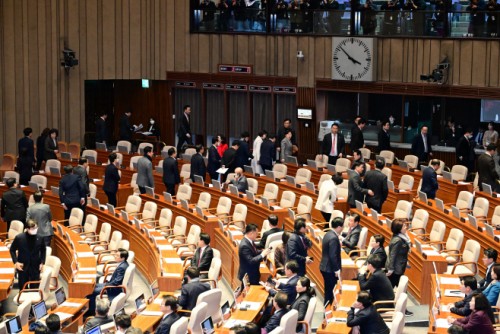 |
| Lawmakers from the ruling People Power Party (PPP) leave the plenary chamber on Dec. 28, 2023, before a special bill proposing to launch an investigation into a land development project is put to a vote./ Photographed by Lee Byung-hwa |
By AsiaToday reporter Park Ji-eun
The National Assembly’s Science, ICT, Broadcasting, and Communications Committee on Monday passed a bill aimed at establishing an independent space and aerospace agency, named the Korea Aerospace Administration (KASA). The envisioned agency will function as the nation’s own version of the U.S. National Aeronautics and Space Administration (NASA). As the bill will be put to a vote at a plenary session of the National Assembly on Tuesday, South Korea is set to join space race in the world as a major player.
If the bill is passed at the plenary session, the agency is expected to be launched in Sacheon, 296 kilometers south of Seoul, around May or June.
Under the proposal, KASA will operate under the Ministry of Science and ICT and be overseen by the presidential science advisory committee. The agency will serve as a central administrative body in charge of aerospace policy, research and development, and industrial advancement.
Starting with the launch of the agency, South Korea is scheduled to establish a roadmap for space exploration and launch a lunar module development project. The blueprint for lunar and Mars exploration plans is expected to be outlined soon.
In particular, the government is planning to land a spacecraft on the moon in 2032. With a budget of 530.4 billion won (US$393 million), it plans to develop a soft landing ship and a lunar module independently based on data gained from the country’s lunar orbiter Danuri, whose mission has been extended by two years until December 2025.
Two existing space-related ministries – the Korean Aerospace Research Institute (KARI) and the Korea Astronomy and Space Science Institute – will be incorporated into KASA. Considering potential dispute among the KARI staff over relocation of the headquarters, they are required to go through the National Assembly’s consent process to move the headquarters to Sacheon. The ruling party is said to have agreed on the clause to reach an agreement with the opposition parties.
Although the Cabinet approved the bill in April 2023, it remained pending due to disagreements between the ruling and opposition parties. The proposal was initially made as part of the Yoon Suk-yeol government’s long-term plan to seek growth momentum for the country’s space industry.
#NASA #South Korea #KASA #space agency
Copyright by Asiatoday
Most Read
-
1
-
2
-
3
-
4
-
5
-
6
-
7





















